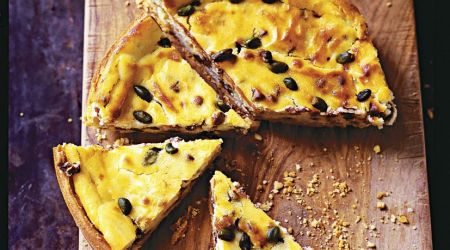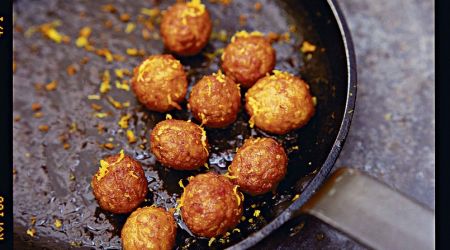Giorgio Locatelli
After an explosion that destroyed his restaurant, Giorgio Locatelli has had time to reflect. Mark Sansom hears how the chef – who went from the Italian army to a top Swiss kitchen – has found a new focus in lifeI see the dog before I see the man. A tiny, six-month-old, charcoal-black cockapoo with a diamante collar marked Olive, being walked by a chef regarded as one of the loudest and most hostile of his generation. A man with hair as big as his bark, who sacked 36 chefs in a month when in charge of Zafferano and another set purely for being French.
As Giorgio Locatelli extends his hand, wearing a Riviera-chic navy polo shirt with tailored chinos and a tightly cut salt-and-pepper quiff, everything I’ve heard about him melts away. His persona screams warmth, good-manners and an immeasurable love for everything his restaurant stands for.
And his Marylebone restaurant Locanda Locatelli stands for a lot. Just over a year ago, Giorgio lost his brother. Three months later, a gas explosion in an adjoining hotel decimated his restaurant’s kitchen. One of his staff was left trapped under a collapsed wall for two hours, one was blown out of his shoes by the blast and many, unsurprisingly, were in floods of tears. The emotion is palpable as he remembers. ‘Plaxy [his wife and front-of-house manager] was in bed and I had just got home from a shift when the phone rang. I knew it would be bad when
I heard my restaurant manager’s voice. I could hear sirens in the background and screaming. Roberto could hardly talk as he explained it. Plaxy and I jumped in the car and were there in five minutes. It was utter devastation,’ he falters and takes a measured sip of his second cappuccino (the first is sent back for being too milky). ‘I knew we were one man short. Marco was missing and they wouldn’t let us near the building. We’re like a family here. Most of my staff come from Italy barely able to speak English and we train them in every aspect of life. Family is the most important thing for me.’ Cue a large dose of perspective.
Luckily, Marco wasn’t seriously injured. After that day, Giorgio vowed to look at life in a new way. He and Plaxy took a holiday where they decided a slower pace came first. As I meet him four months after reopening, he’s clearly in a good place. The bags under the eyes have receded and his hair is shorter and greyer than I’ve seen in photos. ‘After the blast, I went grey overnight. It was the sign I needed to slow down.’ The hair marks a physical sign of his own metamorphosis.
Giorgio had been living his life at a speed akin to a racing driver on Italy’s Monza grand prix circuit. From the moment his grandfather mistook him for a partridge and put six shotgun pellets in his backside aged six, to the time he crashed a 100mph motorbike on a track day leaving him needing surgery aged 48, he barely stopped.
He produced his first dish (fruit salad) aged eight in his grandfather’s hotel and restaurant on the banks of Lake Comabbio, and stayed at the pass until joining the Italian army for military service.
‘I was a sniper,’ he lifts his hands and trains the crosshairs on me, ‘I was a great shot. I’d always done archery as a kid and found it easy. What wasn’t easy was the waiting. We would spend a week of four hours on, two hours off guarding an ammunition cache in the northern Italian hills. No bloody sleep.’ Did he tell them he was a chef? ‘No way. I’ve never been very good at taking instructions. I like to work with small pots; and couldn’t imagine stirring one of those big vats all day, every day. I also wouldn’t want to work for those arsehole officers.’ It’s fair to say he was never one to pander to authority.
On leaving the army, the five-star Dolder Grand hotel in Zurich beckoned. ‘I liked it there. They were real chefs – real people, really wild people.
There were some who would drink three or four bottles of wine before a lunch service. You can imagine what that was like, but it was fun.’ With a knowing nod, he gives me the impression he had more than his share of the fun, but knew when it was time to move on. From there, he went to London and four years in the late Eighties at The Savoy under Anton Edelmann. He credits his time there as the most impactful of his career.
‘Anton gave me the building blocks to become a real chef. He taught me organisation, kitchen management and that a restaurant was more than about food. Up to that point it was all about me, and the plates I served. I learnt it was about the experience that we give and how guests receive it as a complete whole. A restaurant is about more than three courses and that’s what we try to do here.’
He left London on a high, ready to complete his education in France with a view to securing a position at a prestigious Parisian three-star, but the positive outlook shifted. A snapshot of his time there goes a little way towards explaining his disdain for the French.
‘Paris was awful. I worked at Tour d’Argent by the Seine and had the repertoire the other chefs didn’t.They were all good chefs du terroir – cooking food of their region – but they didn’t know haute cuisine like me.’ And it wasn’t just jealousy that came across, but downright racism. ‘Not once in a year and a half did they call me by my name. It was either ‘Spaghetti’, or ‘Wop’. They said to me, ‘You’re the worst. You’re a spaghetti who learned to cook French by a rosbif.’ They used to do all sorts to ruin me. They’d turn the oven down when I had a soufflé in it; swap pans on the pass in front of the head chef; anything to make me look bad. I could not wait to get out of there.’
He looks as animated as I can imagine him 20 years ago when he talks about France, with an anger that’s not there when he speaks about London. His affinity with the English is palpable. He met Plaxy here and has brought up two kids, sending his 20-year-old daughter Dita to university in Bristol. He’s settled, relaxed and, while nesting in London, has seen more changes to British food than any other country in the world.
‘The English have always been great travellers and that is why they are world leaders in food at the moment. As holidays to Italy, Europe and the rest of the world have opened up, people have brought back an education in food. With an open mind comes an open palate and with both of these comes the best of everything.’
As we dwell on the profundity of this statement, the reverie is broken by his PA, Alessandra, and a yapping Olive just about to head out on a walk. ‘Pah,’ he sighs. ‘There are three important things in life: family, food and love. Life is good, and now I can swallow anything.’ He snaps out of chef mode and back into doting dog dad. ‘Alessandra, have you got a poo bag? Let’s go for a walk.’ And with that, he throws back his coffee, shakes my hand, and jogs after his dog into the sunny Marylebone afternoon. Indeed, perspective is something Giorgio Locatelli will never take for granted. locandalocatelli.com

Recipes
Get Premium access to all the latest content online
Subscribe and view full print editions online... Subscribe


